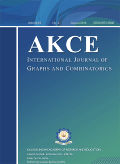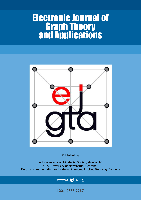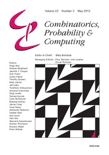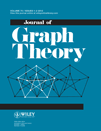
AKCE International Journal of Graphs and Combinatorics
Scope & Guideline
Pioneering Research for a Dynamic Mathematical Landscape.
Introduction
Aims and Scopes
- Graph Theory:
A core area of focus, graph theory encompasses various properties, structures, and applications of graphs, including domination, coloring, and labeling. - Combinatorial Structures:
The journal explores combinatorial aspects related to graphs, such as hypergraphs and network structures, emphasizing their mathematical properties and applications. - Algebraic Graph Theory:
This area involves studying graphs through algebraic methods, including the examination of graph spectra, zero-divisor graphs, and their relationships with algebraic structures. - Game Theory and Graphs:
The integration of game theory concepts with graph structures is a notable theme, exploring strategic interactions modeled through graph representations. - Applications in Network Theory:
The journal often features research on practical applications of graph theory in network design, optimization, and communication systems.
Trending and Emerging
- Advanced Graph Labeling Techniques:
Recent papers have increasingly focused on sophisticated labeling methods, such as total Roman domination and antimagic labeling, highlighting their importance in both theoretical and practical applications. - Intersection of Graph Theory and Algebra:
The relationship between graph theory and algebraic structures, particularly zero-divisor graphs and spectral graph theory, has gained prominence, indicating a growing interest in algebraic methods within graph research. - Graph-Based Network Applications:
The application of graph theory in network scenarios, such as communication networks and social networks, has emerged as a significant trend, reflecting the real-world relevance of graph studies. - Metric Dimension and Domination in Graphs:
Research focusing on metric dimensions and various domination parameters has surged, pointing to a deeper exploration of how these concepts can optimize network structures. - Game-Theoretic Approaches to Graph Problems:
The integration of game theory with graph structures is becoming increasingly prevalent, indicating a trend towards the analysis of strategic interactions within graph-based frameworks.
Declining or Waning
- Classical Graph Algorithms:
Topics centered on traditional algorithms for graph traversal and basic manipulation have become less prominent, as researchers pursue more complex and application-driven methodologies. - Elementary Graph Properties:
Basic properties and characteristics of graphs, such as simple connectivity or degree sequences, are appearing less frequently, indicating a shift towards more intricate analyses. - Historical Perspectives on Graph Theory:
Papers that focus on historical or retrospective analyses of graph theory concepts have decreased, suggesting a move towards contemporary applications and developments.
Similar Journals

DISCRETE APPLIED MATHEMATICS
Pioneering Research in Discrete and Combinatorial Sciences.DISCRETE APPLIED MATHEMATICS, published by ELSEVIER, is a premier journal dedicated to advancing the fields of Applied Mathematics, particularly focusing on Discrete Mathematics and Combinatorics. Since its inception in 1979, the journal has established itself as a vital resource for researchers and practitioners alike, achieving a commendable Q2 ranking in both applied and discrete mathematics categories as of 2023. With an ISSN of 0166-218X and an E-ISSN of 1872-6771, the journal serves an international audience by disseminating significant findings and fostering innovation in mathematical applications. Its Scopus ranking positions it notably within the top tier, ranking #23 out of 92 in Discrete Mathematics and Combinatorics, highlighting its impact in the academic community. Although the journal is not open access, it remains accessible through institutional subscriptions. Researchers, professionals, and students are encouraged to engage with the relevant and rigorous research published in this esteemed journal, as it plays a crucial role in shaping the future of mathematical sciences.

Electronic Journal of Graph Theory and Applications
Fostering collaboration in the dynamic world of graph theory.The Electronic Journal of Graph Theory and Applications, published by Institut Teknologi Bandung, is a prominent open-access journal since 2013, dedicated to the dynamic field of graph theory and its various applications. With an ISSN of 2338-2287 and an impressive categorization in 2023, the journal stands at Q2 in both Applied Mathematics and Discrete Mathematics and Combinatorics, reflecting its growing influence and recognition within the academic community. With its geographical base in Bandung, Indonesia, the journal seeks to provide researchers, professionals, and students with a platform to disseminate innovative research and applications, bridging gaps in both theoretical and practical domains. The Scopus rankings further establish its commitment to excellence, notable as Rank #54/92 in Discrete Mathematics and Combinatorics and Rank #473/635 in Applied Mathematics. By facilitating open access to high-quality research, the Electronic Journal of Graph Theory and Applications significantly contributes to advancing scholarship and encourages diverse perspectives within the field.

CANADIAN JOURNAL OF MATHEMATICS-JOURNAL CANADIEN DE MATHEMATIQUES
Advancing mathematical excellence, one article at a time.Canadian Journal of Mathematics - Journal Canadien de Mathématiques is a prestigious peer-reviewed journal published by Cambridge University Press, which aims to advance the field of mathematics through the dissemination of high-quality research articles. With its ISSN 0008-414X and E-ISSN 1496-4279, the journal plays a pivotal role in fostering mathematical research and collaboration. It has been recognized for its impactful contributions, currently holding a category quartile ranking of Q2 in Mathematics (miscellaneous) for 2023 and sits in the 66th percentile among its peers according to Scopus rankings. As the journal continues its convergence from its inception in 1994 through to 2024, it remains a vital resource for researchers, professionals, and students seeking to stay at the forefront of mathematical developments. The journal does not operate under an open access model, allowing for a curated collection of articles that adhere to rigorous academic standards.

Periodica Mathematica Hungarica
Elevating Research Standards in Mathematical Studies.Periodica Mathematica Hungarica is a prestigious academic journal published by Springer, focusing on the field of mathematics, with a particular emphasis on miscellaneous mathematical studies. Established in 1971, this journal has maintained its commitment to advancing mathematical research and its applications, making significant contributions over its converged years through 2024. With a Q2 ranking in the mathematics category as of 2023, it establishes itself as a vital resource within the mathematical community. Researchers and academics will find its inclusion in the Scopus database, ranking #189 out of 399 in general mathematics, indicative of its impact and relevance. Although it does not feature open access, the journal provides a wealth of high-quality peer-reviewed articles, thereby serving as an essential platform for the dissemination of innovative mathematical theories, methodologies, and findings. Engaging with the content of Periodica Mathematica Hungarica is crucial for anyone looking to stay at the forefront of mathematical research and development.

DISCRETE MATHEMATICS AND THEORETICAL COMPUTER SCIENCE
Shaping the Future of Computer Science through Discrete MathematicsDISCRETE MATHEMATICS AND THEORETICAL COMPUTER SCIENCE, published by DISCRETE MATHEMATICS THEORETICAL COMPUTER SCIENCE in France, stands as a significant open-access journal since 1997, publishing innovative research articles within the intersecting disciplines of discrete mathematics and theoretical computer science. With an ISSN of 1462-7264 and an E-ISSN of 1365-8050, this journal aims to provide a platform for scholarly discourse and dissemination of knowledge, making it accessible to a global audience. It is recognized for its contributions, achieving a Q2 ranking in both Computer Science (Miscellaneous) and Discrete Mathematics and Combinatorics, alongside a Q3 ranking in Theoretical Computer Science as of 2023. The journal’s rigorous selection process ensures that only high-quality research is published, promoting advancements in these critical areas of study. Researchers, professionals, and students alike can benefit from its comprehensive articles that not only enhance theoretical understanding but also foster practical applications in the ever-evolving landscape of computer science.

Discrete Analysis
Advancing the Frontiers of Discrete MathematicsDiscrete Analysis, published by ALLIANCE DIAMOND OPEN ACCESS JOURNALS, is a pioneering open access journal that has been contributing to the fields of Algebra, Number Theory, Discrete Mathematics, Combinatorics, Geometry, and Topology since its inception in 2016. Based in the United Kingdom, this journal is highly regarded, holding a prestigious Q1 ranking across key mathematical disciplines as of 2023, which underscores its influence and reputation within the academic community. With rigorous peer-review standards and an accessible platform, Discrete Analysis is dedicated to disseminating high-quality research that fosters advancements in mathematical theory and application. By embracing the open access model, the journal ensures that scholarly work is readily available to researchers, professionals, and students alike, promoting greater collaboration and innovation in mathematical research. For up-to-date insights and contributions in the field, Discrete Analysis is an essential resource.

COMBINATORICS PROBABILITY & COMPUTING
Shaping the Future of Probability and Combinatorial ScienceCOMBINATORICS PROBABILITY & COMPUTING is a premier journal published by Cambridge University Press, focusing on the cutting-edge fields of combinatorics, probability, and their computational aspects. Established in 1992 and set to continue its impactful discourse through 2024, this journal holds a distinguished reputation, reflected in its Q1 ranking in applied mathematics, computational theory, and statistics, showcasing its pivotal role in advancing research in these areas. With an ISSN of 0963-5483 and an E-ISSN of 1469-2163, the journal welcomes high-quality papers that contribute to the theoretical foundations and practical applications of the disciplines. While it is not available as open access, its accessibility through institutional subscriptions ensures wide readership within academia. The journal is a vital resource for researchers, professionals, and students alike, providing a platform for innovative ideas and pioneering research that shapes the future of mathematics and computer science.

JOURNAL OF GRAPH THEORY
Advancing the Frontiers of Graph TheoryJOURNAL OF GRAPH THEORY, published by WILEY, stands as a pivotal resource in the fields of Discrete Mathematics and Combinatorics, as well as Geometry and Topology. Since its inception in 1977, this esteemed journal has fostered the dissemination of influential research, currently categorized in the prestigious Q1 quartile according to the latest metrics for 2023. With an ISSN of 0364-9024 and an E-ISSN of 1097-0118, it caters to a global readership of researchers, professionals, and students dedicated to advancing their knowledge in graph theory. By maintaining a strong rank in Scopus—39th out of 106 in Geometry and Topology, and 38th out of 92 in Discrete Mathematics and Combinatorics—it reflects its significance and impact within the academic community. Although it does not offer open-access options, its rigorous peer-review process ensures that only high-quality original research is published, thus reinforcing its reputation as a leading journal in this mathematical domain.

Discrete Mathematics Letters
Connecting ideas in Discrete Mathematics and beyond.Discrete Mathematics Letters is a prominent open-access journal dedicated to advancing the field of Discrete Mathematics and Combinatorics, published by Shahin Digital Publisher. Since its inception in 2019, this journal has rapidly established its presence in the academic community, securing a respectable Q2 category ranking in the 2023 Scopus database, positioning itself at rank #45 out of 92 in its field, making it a valuable resource for researchers and practitioners alike. With a commitment to disseminating high-quality research, Discrete Mathematics Letters provides an accessible medium for sharing innovative ideas and findings within the mathematical sciences, ensuring that researchers, students, and professionals stay informed about the latest developments. As an open-access journal, it provides free access to publications, fostering collaboration and knowledge exchange among the global research community.

DISCRETE MATHEMATICS
Unraveling the complexities of mathematical structures.DISCRETE MATHEMATICS, published by Elsevier, is a leading journal dedicated to the field of discrete mathematics and combinatorics, with a distinguished presence in the academic community since its inception in 1971. With an ISSN of 0012-365X and an E-ISSN of 1872-681X, this esteemed journal has firmly established itself within the Q1 category for Discrete Mathematics and Combinatorics, and Q2 for Theoretical Computer Science as per the 2023 metrics, underscoring its pivotal role in advancing research in these vital areas. DISCRETE MATHEMATICS is highly regarded, reflected in its Scopus rankings, where it stands at #44 out of 92 in its primary category, contributing significantly to the global discourse on complex mathematical theories and applications. Published from the Netherlands, the journal serves as a crucial resource for researchers, professionals, and students looking to stay informed about the latest innovations and methodologies in discrete mathematics. Though currently not an open-access journal, DISCRETE MATHEMATICS continues to foster a vibrant scholarly community through rigorous peer-reviewed research, promoting a deeper understanding of the mathematical structures that underpin both theoretical and applied science.